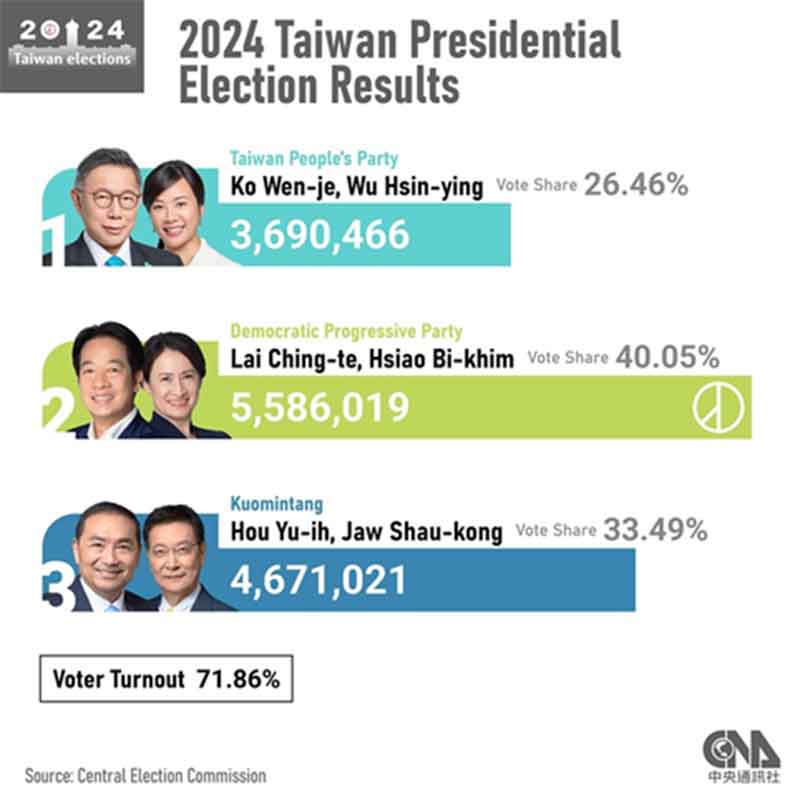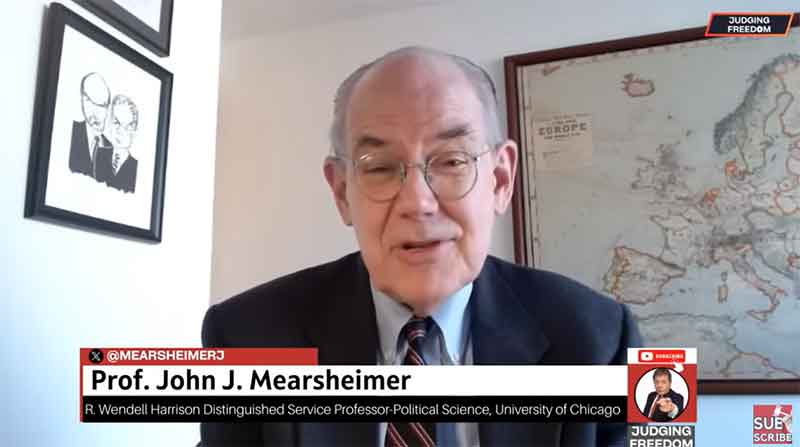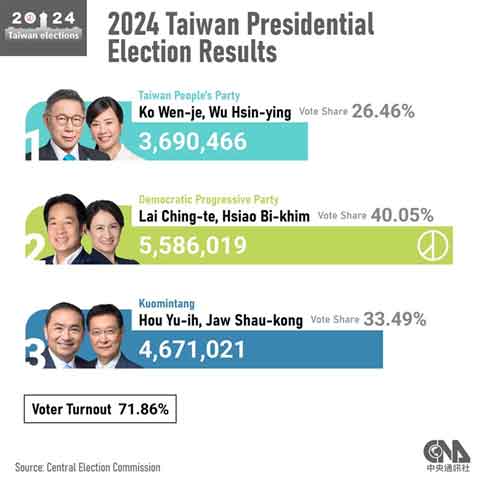The DPP is fighting a losing battle and lacks a strong mandate, as evidenced by the fact that 60 percent of the population on the island did not vote for them..Contrary to the misleading claims made by the US and the media, it is not about the issue of “democracy” and never has been.

Following the Taiwan regional elections, the Western media quickly congratulated Lai Ching-te as the new leader of the island under the Democratic Progressive Party (DPP). Lai is a staunch advocate of “Taiwan independence,” perhaps even more so than his predecessor.
The result of the elections led Western reporters to aggressively speculate that this would imminently lead to war, and they delighted in using headlines such as the result “angers China,” deliberately misinterpreting and omitting the nature of the one-China principle.
However, within days of the result, Nauru announced its decision to recognize the one-China principle, break the so-called “diplomatic ties” with the Taiwan authorities and seek to reestablish diplomatic ties with China. This leaves Taiwan with just 12 official “diplomatic allies,” a number which in the coming years will almost certainly drop into single figures. Nauru is a country that has struggled with its economy since its resources run out and has been heavily financially dependent on Australia. Thus, the decision to reaffirm its relationship with China is a no-brainer.
The latest development teaches us that the mainland has the leverage, resources, influence and capabilities to affirm unification, making internal matters on the island inconsequential.
As long as Taiwan insists on independence politics, its international isolation ultimately will only increase and the outcome will not differ. The Chinese mainland’s determination to secure this outcome is politically unshakeable and consistent. Therefore, what is best for Taipei is to come to the negotiating table rather than fight a losing battle.
Secessionists in Taiwan region invest a significant amount of money to promote their status as “an independent nation” and antagonize the mainland.
This includes openly funding anti-China organizations like the Inter-Parliamentary Alliance on China (as stated on their website) and lucratively paying political has-beens and right-wing politicians to visit the island and make provocative statements. Figures such as Mike Pompeo, Liz Truss and Scott Morrison have reportedly received hundreds of thousands of dollars for this purpose.
Through this public relations strategy, the island’s leadership attempts to strain the mainland’s relationships with other countries by staging political stunts and provocations, such as applying to join the Comprehensive and Progressive Agreement for Trans-Pacific Partnership or the International Criminal Court, or enticing countries like Lithuania to break the one-China policy.
However, despite considerable support of the mainstream Western media outlets for these actions, the outcome has not and will not change. The international community, including the United Nations, overwhelmingly adheres to the one-China principle, recognizing that Taiwan region is a part of the People’s Republic of China.
Despite the separatists’ attempts, Taiwan’s number of “diplomatic allies” continues to decline. This is because, from the perspective of national interest, it defies common sense for countries to not engage with the world’s second-largest economy in favor of a small island that cannot provide the same economic, diplomatic and developmental support.
By accepting the one-China principle, countries are increasingly discovering new opportunities for themselves. This unlocks new export markets, attracts new investments and helps them secure greater autonomy and balance in their foreign policy to protect their best interests.
The one-China principle is not about hegemony, dominance, ideology or forging alliances or blocs. It is ultimately about respecting the principle of lawful national sovereignty among states. Countries of all backgrounds and political systems respect the one-China principle.
Contrary to the misleading claims made by the US and the media, it is not about the issue of “democracy” and never has been.
The DPP is fighting a losing battle and lacks a strong mandate, as evidenced by the fact that 60 percent of the population on the island did not vote for them.
The mainland is confident that its goal of reunification will be achieved without resorting to the use of force. It has the momentum, resources and capabilities on its side.
Contrary to Western media propaganda, this is not about aggression, expansionism or any form of unlawful behavior. It is about correcting a historical injustice caused by the intervention of external powers that separated the two sides of the Taiwan Straits.
Beijing seeks the rightful reunification of the Chinese nation. It is confident that it will achieve this goal, and it is only a matter of when, not if. It is up to the DPP to accept reality and move forward in the best interests of the island.
*** ***
First Published: Jan 16, 2024, in globaltimes.cn
James A. Smith is a political commentator , historical relations analyst, and theorist, a literary scholar and a podcaster. James teaches literature at Royal Holloway, University of London. He has run The Popular Show podcast since 2020, and is the author of Other People’s Politics: Populism to Corbynism and Work Want Work: Labour and Desire at the End of Capitalism (with Mareile Pfannebecker).
Follow James on X/Twitter: @thepopularpod.
See Related article in Countercurrents.org, 21/01/2024.
Taiwan Elections: The DPP was back in power, but forces of peace emerged stronger















































